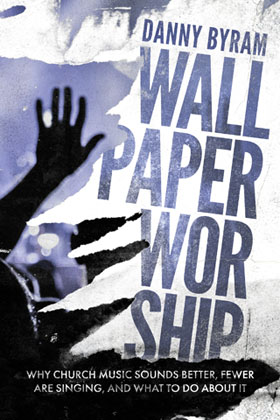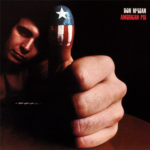loading...

by Danny Byram | Jun 4, 2019 | christian worship, christianmusic, Church Leadership, Contemporary, Leadership, Music & Songwriting, pastor, wallpaper worship, Worship, worship songs, worshipleader, worshipmusic

The church in America is in a cycle of prosperity. Impressive church venues are everywhere. Millions of dollars are spent to remodel sanctuaries, build new ones, purchase gear, keep up the latest trends in stage production – live video capturing – and worship song-set automation software. Yet, many who attend services find themselves standing in silence, watching screens, and observing performers on a platform. I call this lack of congregational engagement Wallpaper Worship.
In his endorsement of my book, author Philip Yancey says: “In my lifetime worship has changed from something we do before an audience of God to something a few semi-professionals do for an audience of us.”
C.S. Lewis recognized this problem over 70 years ago: “The perfect church service would be the one we were almost unaware of. Our attention would have been on God. But every novelty prevents this.”
WORSHIP LEADERS: “SOMETHING’S WRONG, BUT WE DON’T KNOW WHAT IT IS.”

In my work with worship leaders across the country, I hear from good-hearted, talented church musicians: “Something is wrong, but we don’t know what it is.”
Let’s consider… The “worship industry” is now a multi-billion-dollar segment of the music and entertainment industry. The American church market purchases over $1.5 billion a year of production gear from audio and video retailers (Music Trades magazine, February 2019). Worship song-publishing/recording companies produce new songs daily, with videos promoting a singular sound – a monochromatic look – and a homogenized form of leading from the platform.
Is this new? Technologically, yes. Historically, no.
Throughout history, expressions of worship were governed by rules which reduced congregational participation to “stare-at-the-platform-and-listen-to-us.” Priests clad in gorgeous attire with elaborate “worship gear” on sanctuary altars, would perform worship for the people. The problem? (There were many…) Leaders led in Latin which most worshipers didn’t speak or read, and congregational participation was allowed only during the Eucharist. The result? Congregants simply watched and listened. Sound familiar?
Even more concerning was when the church found itself relying on monarchies, dynasties and other secular shareholders to promote its mission. The problem? When the church becomes an industry-driven machine – opposed to a spirit-and-truth-driven organism – its message can become diluted and its mission compromised. The result? The message of human fallenness, repentance, redemption, sacrifice, suffering, and sanctification becomes eclipsed with messages of personal actualization, self-healing, and emotional relief from social, political or personal injustices. Sound familiar?
PASTORS TO WORSHIP LEADERS: “MAKE IT LOOK AND SOUND LIKE THAT!”

Leading music in today’s church, even in small rural settings, can quickly become about mimicking the latest worship-industry wave to attract more sheep. Seems like a worthy idea. However, when the worship industry needs and feeds the church, and the church needs and feeds the worship industry – resulting in passive or even frustrated congregants – then something may indeed be wrong.
Pastors or elders will view YouTube videos of arenas full of worship-music fans, with hands in the air, gathered in front of a stage occupied by music professionals – supported by world-class venue production, pristine sound, eye-candy lighting and smoke – and then dictate to their worship leaders: “Your job is to make our Sunday service look and sound like THAT.” After long hours and spent offerings, often the result is local congregants passively watching screens, silently sitting, or leaving for coffee – feeling performed at by musicians they’ve never seen before in their church.
Worship leaders ask: “What do we do now? Bigger production? More expensive effects? Newer songs? Slicker automation? What more do they want? What’s wrong with THEM?” To find relevant answers, perhaps we should ask different questions:
- Do we even believe something is wrong?
- Regarding local church worship: Does one size fit all?
- Is some corporate industry pushing the idea that ‘one size fits all?’
- If so, who and why?
I do not think there is some sinister plan by the music industry to undermine the church it profits from. However, history clearly reveals the church as vulnerable to being wooed from her mission and message, especially when there are billions of dollars involved.
So what’s the SOLUTION? As shepherds of worshipers, our job is to lead in a language our sheep understand and respond to. The Object of our worship said, “My sheep hear my voice and will not follow a hireling.” (John 10). If worshipers are not following, leaders are responsible. Good shepherds will make adjustments on behalf of their sheep (Ezekiel 34) – laying down their own preferences, agendas, and yes – even their lives.
Does one size fit all? What do you think? Please comment below.
Singer/Songwriter/Speaker/Author DANNY BYRAM has performed on over 100 US military installations worldwide since 1987. His work earned him the name “The Combat Musician” from chaplains and troops. Danny also directed 26 Promise Keepers NFL-Stadium events for men, including the Clergy Conference (the largest gathering of clergy in history), and 36 FamilyLife arena events for couples, working alongside Marantha! Music and Integrity Inc. His book: WALLPAPER WORSHIP: Why Church Music Sounds Better, Fewer Are Singing And What To Do About It is available on Amazon, Christian Book Distributors, and from CLCPublications.com. His music is downloadable through iTunes and Spotify.

by Danny Byram | Jan 23, 2019 | christianmusic, Church Leadership, Contemporary, Leadership, pastor, Worship, worshipleader, worshipmusic

In 1959 Vince Lombardi became the new head coach of the losing team known as the Green Bay Packers. The team’s record said it all: only two winning seasons of twelve. Assuming they had a desire to win, the new coach concluded: what they had been doing wasn’t leading them in a winning direction. As he stood before them, he told his players that under his leadership they would return to the fundamentals of the game. He picked up a football and gave what was to become the most famous quote in NFL history: “Gentlemen, this is a football.”
Coach Lombardi’s point was likely met with reluctance and cynicism. But he knew something his players had long forgotten. They had the uniforms, the equipment, the facilities, and the talent, but they were not reaching the goal. Perhaps the players thought being a professional football team was about looking and sounding like one. What they needed was a new game plan that would harness their assets to lead them to where they ultimately wanted to be.
IS THERE A GOAL LINE IN WORSHIP?

Some say “excellence.” Others say “evangelism.” There are lists of virtuous goals worth consideration. But if you are singing your head off, knocking out new charts, keeping up with constantly changing radio hits, auditioning and training volunteers, chasing the latest gear and gadgets – only to watch your congregants staring at you or your screens, and barely moving their mouths – you need a new game plan.
Worship which is real, is worship which is participatory. Participation of congregants or lack of it – is a result of what we do as leaders from the platform. No matter what form through which we lead, whether a weekly liturgy or a musical production with a sermon at the end, participation of those we are leading is our goal line.
Here are three fundamentals of the game I have followed throughout decades of leading worship.
-
CAST A VISION FOR PARTICIPATION

Conditioning our people from observation to participation is a challenge in the age in which we live, but it is imperative. For instance, if our music is deafening so worshipers cannot hear themselves, it may be sending a vibe: “listen to what we know how to do.” Creating a culture of participation will take experimentation and may involve doing some things that are different than you or they are used to. Cast a vision that worship is active and participatory – not passive and observatory. They are waiting to be led.
-
USE YOUR BINOCULARS

When producing stadium events, it was difficult to know if attendees in upper seating sections were participating, since the platform was the size of a postage stamp when viewed from the back. I would step out of my stage-side tent and use binoculars to see if attendees were connecting like those sitting in the front seats. As a leader, you must watch and see what’s happening with those you are to be leading. Proverbs 27:23 says “Know well the condition of your flocks.” If they are not participating, you must change your game plan until they do. Closing your eyes to the problem is denial and poor leadership.
-
PAINT IN MORE THAN ONE COLOR

Ever been to an art gallery with paintings exclusively in yellow? Ever seen a construction crew build a house with simply a hammer and nail? As a church that possesses worship assets for two millennia, I wonder why we habitually paint in only one color and build with only one tool. Give your worshipers a chance to engage with fundamental and even ancient assets of worship. Example: hymns – not hidden in arrangements – just straight up with a modern approach, sing-able, recognizable. I sprinkle them throughout my sets and the reaction is predictable: of course, older worshipers love them. But even cooler when younger ones say: “Dude, that was awesome; did you write that one?” Or, lead them in unison with the Apostle’s Creed or the Nicene Creed or responsively with a portion of scripture that matches a song or the sermon. Whatever you try, don’t forget these additional colors in your palette. Worship is never simply a singular musical style. Worship is an experience tied to a rich heritage. Watch the participation level increase as you paint in bold colors and lead with more than a hammer and a nail.
REACHING THE GOAL LINE

From 1959-1969 under Lombardi’s leadership, the Packers achieved ten consecutive winning seasons; five of which were NFL championship/Superbowl titles. As we watch one football team emerge from 32 to claim the Vince Lombardi trophy, keep in mind it is not simply because they look and sound good. It’s because they perform the fundamentals of the game with diligence and dedication.
If your worshipers are not participating, consider designing a new game plan to get them over the goal line. Worship Leaders, “this is a football.”

by Danny Byram | Jan 16, 2019 | Church Leadership, Contemporary, Gratitude, Leadership, Liturgical, prayer, Worship, worshipmusic

Downloading tracks. Downloading charts. Finding the right song in the right key. Shooting videos for social media. Setting rehearsal time. Changing rehearsal time. Your drummer cancels on Friday. Lead female vocalist gets a throat infection. The smoke machine breaks down at stage left. Endless chase of the latest gear. Planning time with the team. Meeting with pastoral staff. Budget cuts. Time restraints within the service. Cut a song. Cut two. Your prepared remarks between songs were criticized in the staff meeting. Don’t say anything anymore – just do the music. You’re told: You’re not a pastor, just a musician.
Congregants don’t see these frustrations behind the scenes. They come and watch each week as you pull it off seamlessly like a pro. Yet you feel you have to hold it all inside. Keep it together. The pressure and frustration of what you once felt was your calling has become a job – or worse, a machine; predictable, produced, even pretentious. You are noticing you haven’t been alone in God’s presence for quite a while. You catch a prayer when you can. Your fuse is becoming shorter. Things that used to not bother you, bother you. That “sin that so easily besets you” emerges again. You confess and move on but it comes back anyway.
Sound familiar? Where is God in the worship grind? What is described above used to be exclusive to larger churches. Now, with social media expectations – a worship-music industry driving its images and products – and church growth formulas nipping at our heels – is it any wonder why churches of 200 or less are experiencing the grind as well?
Jeremiah 33:3 serves as a benchmark to busy activity, massive scheduling, goal setting, and strategic planning. “Call to me and I will answer you, and I will show you great and mighty things which you do not know.” (NASB). So, what is it we don’t know, that we need to know? Our gear is great, our media is moving, our following fantastic, our image immaculate, and our hearts are humble!
Consider the context of Jeremiah 33:3. For the first 32 chapters, God is using Jeremiah as His mouthpiece to speak prophetic words to the people of Israel and their leaders. Though the book is not laid out chronologically, it is apparent this far into the story that Jeremiah is still in need of knowing “great and mighty things” which he hasn’t yet discovered. God requires His “mouthpieces” to call to Him, and then listen.
Finding God in the worship grind will either happen by our own choice or by His choice. God will be found because we are awed by His sacredness – or – we are stopped in our tracks because the gears of the grinder have come to an abrupt halt. I have experienced both. I prefer the former not the latter. Believe me, you do too.
Recommended books: “Letters To The Church” – Francis Chan. “Abba’s Child” – Brennan Manning
Photo by Ben White on Unsplash

by Danny Byram | Nov 25, 2018 | Advent, Christmas, Church Leadership, Gratitude, Leadership, Surprise, Worship

Do you enjoy surprises? Some love them, others not so much. For example, those of us who are married realized, at some point, we married our opposite. During courtship, engagement, and the honeymoon we are interested in the same activities and respond alike. This “opposite-discovery” is not fully revealed until after a few years of living together. Right? That’s called a “surprise.”
Those who enjoy being surprised prefer the fresh unpredictability surprises brings to life. Surprises remind them that someone was thinking specifically of them in order to pull off the surprise. On the other hand, those who dislike being surprised enjoy the routine of knowing what’s coming. Predictability gives them a feeling of security because the world is ever changing. Receiving a gift tells them the giver had their best interest in mind because the gift was exactly what they asked for.
From Genesis through the New Testament the “God-surprises” are everywhere: The great flood of Noah; Sarah’s birthing her baby boy Isaac in her advanced age; Joseph’s journey from brat-brother to slave to prisoner to second-in-command of Egypt; young Mary’s virgin pregnancy. The list goes on…
As surprising as God’s activities were throughout scripture, He always chose to drop clues as to what He would be up to. Those who were watching and listening were ready for the surprise when it came. Those who chose not to hear or heed the clues were taken completely by surprise.
The biggest surprise in human history is annually celebrated during the season of Advent and Christmas. All the clues for this surprise were given centuries prior through Israel’s prophets. But to those who were not ready and those who are still not ready, this story is the grandest surprise of all time: A baby boy is the Son of God. Surprise! Born in obscurity and poverty. Surprise! A half Jewish monarch threatened by this surprise kills all baby boys two years and under, mimicking the Egyptian Pharaoh at the birth of Moses. Surprise! The gifts left by the Magi would possibly provide sustenance for the holy family as they flee to Egypt to save the boy’s life. Surprise! The boy grows up, becomes the most quoted carpenter-turned-rabbi of all time. Surprise! He willingly offers His life to redeem the world’s sins and invite both Jews and Gentiles of all races, locations and religions to join themselves to God the Father through Him. Surprise! He becomes the only person in history to be seen walking, talking, eating broiled fish, appearing and disappearing in a full fleshly body after he dies. Surprise!
Whether we enjoy surprises or not, the Bible assures its readers God’s surprises will continue. The Old Testament Jews called them prophecies. The Apostle Paul called them “birth pains of what is to come.” (Romans 8:18-25)
Will God’s surprises rock your life? If we are ready, listening and aware, we may not be as surprised as we think.
Follow Danny on Instagram, Facebook, Twitter, YouTube, Soundcloud
Photo by Ben White on Unsplash

by Danny Byram | Nov 10, 2018 | Church Leadership, Gratitude, Leadership, patriot, veterans

In 1877 the tune “Mary Had A Little Lamb” was aurally reproduced from the first phonograph. Two years later the same man created the light bulb. Though American inventor Thomas Edison was one of a kind, the fact that he was an American is not what made him exceptional. Throughout history there were scores of great and lasting inventions from French, German, Danish, Dutch and English minds. Inventors are not exclusively American. So what is?
Columnist George Will quotes a participant in NATO’s 1949 founding as saying the alliance’s purpose in overseeing post WW2 European protection was to keep “the Russians out, the Americans in…” The assumption was that the United States was not interested in maintaining its 1944 D-Day invasion to eventually make Europe its 51st state. After 70 years one would think the world would get the message: US military installations placed in Europe remain to discourage ambitious imperialists from trying their hand at state building. Vladimir Putin’s recent return to Soviet invasion tactics assumes the opposite of the NATO founder’s statement: “If America is out, the Russians are in.”
Is America out? Has America resigned its post WW2 role as the leading voice of freedom for other freedom-seeking nations of the world? How many years will it take to convince international critics, and the ones within our own borders, that bases in foreign countries exist to protect those countries and our interests from the “Putins” of coming generations? If 70 years of our European military presence hasn’t convinced these proponents of “American pull-back” – perhaps their view is simply ideologically driven denial. Pull back the US from leading the world and guess what you get in return?
What makes America exceptional is in its founding documents. “We hold these truths to be self-evident; that all men are created equal; that they are endowed by their Creator with certain inalienable rights: (the rights of) life, liberty and the pursuit of happiness.” America is exceptional because of its inherent belief in a Creator who endows these rights to all. Those rights are not earned but are assumed regardless of race, age or creed.
Therefore those rights must be protected from those who seek to remove them. Since we are the most powerful and wealthiest nation of the world, as well as the global rally-point of the past 238 years for all who seek to live by these rights, it is logical that the USA is exceptionally cast into the role of “leader of freedom.” Even more exceptional is the fact that there is no other nation who has earned that job description.
There will always be those who oppose freedom. But those who live within its warm cloak, who tout the adage that their freedom was ill-gained, unfounded or of little value live under a unique umbrella. Their right to denial is also assumed and even protected by those who vehemently disagree.
What makes America exceptional is what made Thomas Edison exceptional. His inventions were created within a culture of freedom: freedom of expression, freedom of ownership, freedom of financial reward commensurate with exceptional genius; opposed to the state owning his intellectual property. Edison fulfilled his role as a creative leader because he was living and creating within a free culture of exceptionalism. An exceptional nation nurtures exceptional citizens.
When America turns from its fundamental belief of exceptionalism, it loses the moral right to protect others from those who steal freedom. Without the American glue that holds freedom-seeking peoples together, the cohesiveness of freedom’s bond is lost. Chaos is the result. Those who don’t believe in American exceptionalism, yet choose to live in freedom because of it, will be the first to blame America for that which is in chaos.
On Veteran’s Day we owe thanks to those who are at the forefront of freedom’s frontiers, at home and abroad. They are the exceptional of the exceptionals.
“If the foundations are destroyed what can the righteous do?” Psalm 11:3
Photo by Luke Michael on Unsplash

by Danny Byram | Oct 29, 2018 | Church Leadership, Contemporary, Leadership, Liturgical, Traditional, Worship, worshipmusic

I’ve always found the phrase – “We’ve always done it this way” – annoying. I remember my parents (dad a clergyman, mom a church musician) using it when it came to church music and worship. Their form was an organ on one side, piano on the other with a choir in robes in the middle. They knew nothing different. No matter where we would attend, in a different town or state, the form of worship – as well as the nomenclature by leaders and worshippers – was identical. This was it for hundreds of years until the Jesus Movement (cr 1968-74) changed everything. Guitars, folk instruments and undergrads in casual clothing began to appear on church platforms. Many times these young, excited believers were escorted out of the church by older church leaders likely grumbling: “We’ve always done it this way.”
I hear the phrase still used today, but not by crotchety, balding believers of a greying generation. It is spoken by church leaders in their late 20s and early 30s. In place of pianos, organs and choir chairs the platforms are filled with drum cages, keyboard rigs and Stratocasters with effects pedals. Overhead are multi colored light rigs, massive video screens, smoke machines and video jib arms. While performing (oops…leading), a shoulder cam operator runs around the stage up into the faces of those performing (oops…there I go again…LEADING). When I talk with these young leaders, to suggest perhaps using an ancient creed – or a variety of instrumentation – or responsive reading of scripture – or an acapella every demographic knows (like Amazing Grace without added lyrics from last year’s “radio worship artist” release), here comes the phrase: “We’ve always done it this way.” Like my parents, they know nothing different. Today, no matter where I attend, in a different town or state, the form of worship – as well as the nomenclature by leaders and worshipers – is identical.

Where we are in the “worship cycle” is the youth group rock bands of church basements from 15-20 years ago have come of age. They are now the decision makers in charge of church budgets. What used to be relegated to youth groups, with dilapidated gear from teenage bedrooms, is now polished, front and center. The vibe is: “we’re in charge now, and we’re gonna do this right.” Just like my parents, the current form is all they’ve known.
Increasingly normal is the online streaming of these worship services (oops…”worship experiences.”) Technology has perfected to allow local church platforms to be viewed online for millions of unnamed, unknown, un-faced fans. Many leaders have told me because their online audiences are exponentially larger than their local congregation, onliners are the group they are actually playing to. The attending congregants are now the studio audience for the larger group, somewhere out there watching and giving offerings on their phones.
What an interesting age in which we are doing church. Even though some young families are walking away to start home churches to “do life together,” the current form is firmly established. A cursory historic observation reveals that trends cycle because of a movement, started in spite of the church’s instituted ways, and usually under the church’s nose. No one knows when or where the next movement will start or how it will bring change. But why it will start is likely found behind the phrase: “We’ve always done it this way.”
“All that now is will be forgotten in the days to come.” Ecclesiastes 2:16
Singer/Songwriter/Speaker/Author Danny Byram has performed on over 100 US military installations worldwide. He toured South Korea 15 times & has performed/spoken to US troops in Iraq, Kuwait, Bahrain, Europe, Central America, South America, the Pacific Rim and aboard many surface vessels. His work earned him the name “The Combat Musician.” Danny produced and directed 26 Promise Keepers Stadium Events for men, including the Clergy Conference (largest gathering of clergy in history) and co-directed Stand In The Gap, Washington DC, which drew over a million men to the National Mall. He produced and directed 36 FamilyLife Arena Events for couples working alongside Marantha! Music and Integrity Inc. Danny and Angela Byram live in Colorado and have 3 adult children and two grandsons.
Photos: Top: Rachel Lynette French@rachellynette Middle: Abigail Lynn@shmabbss



























